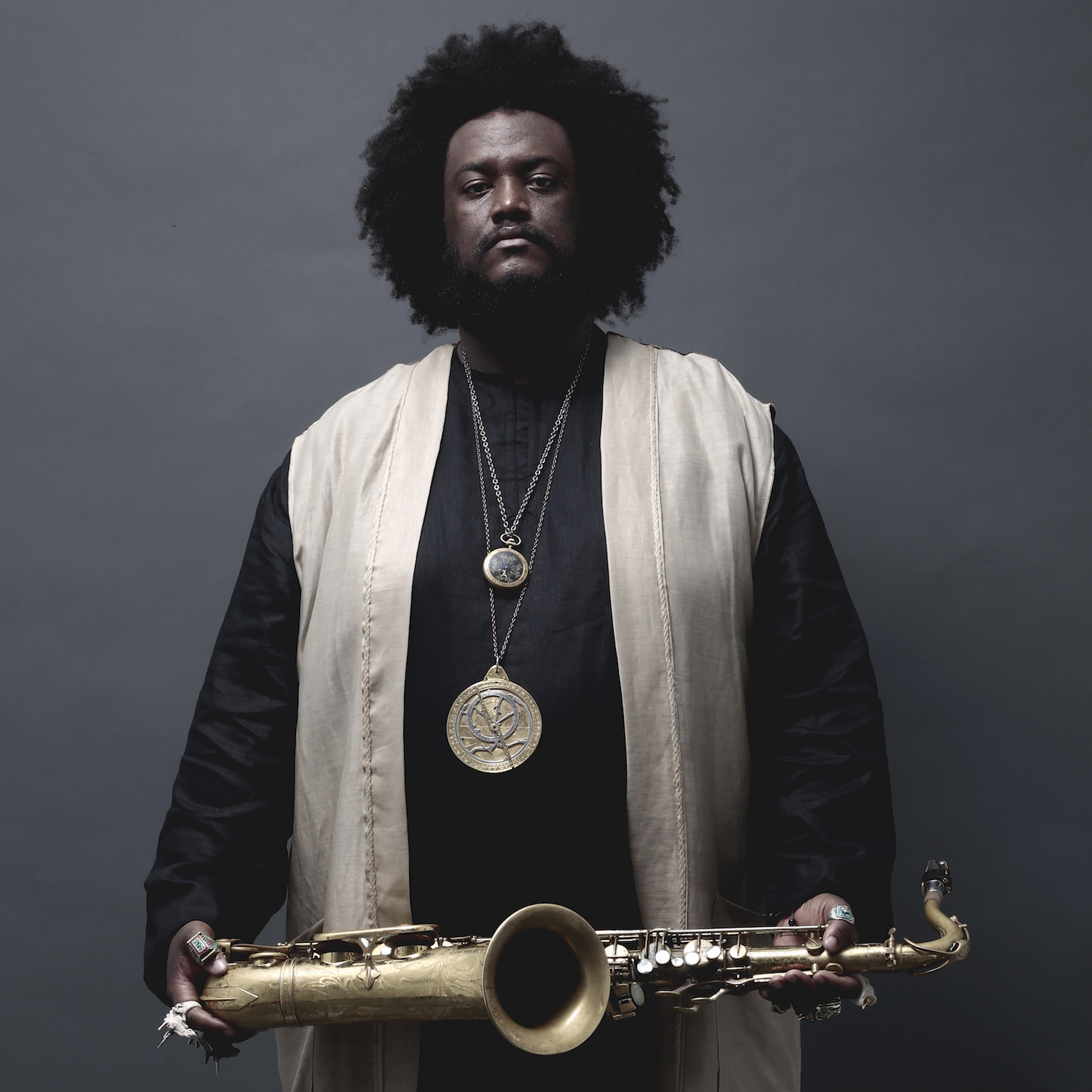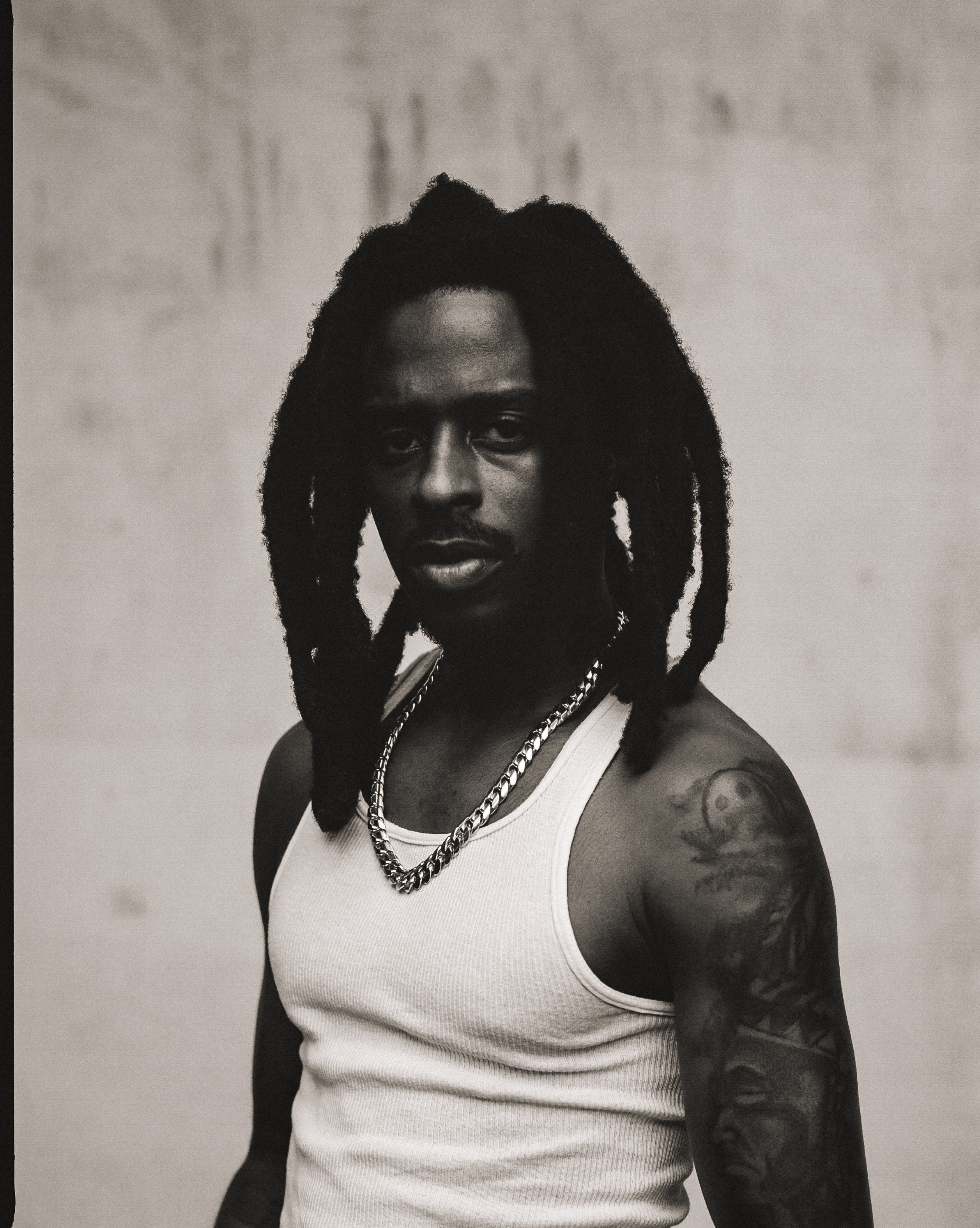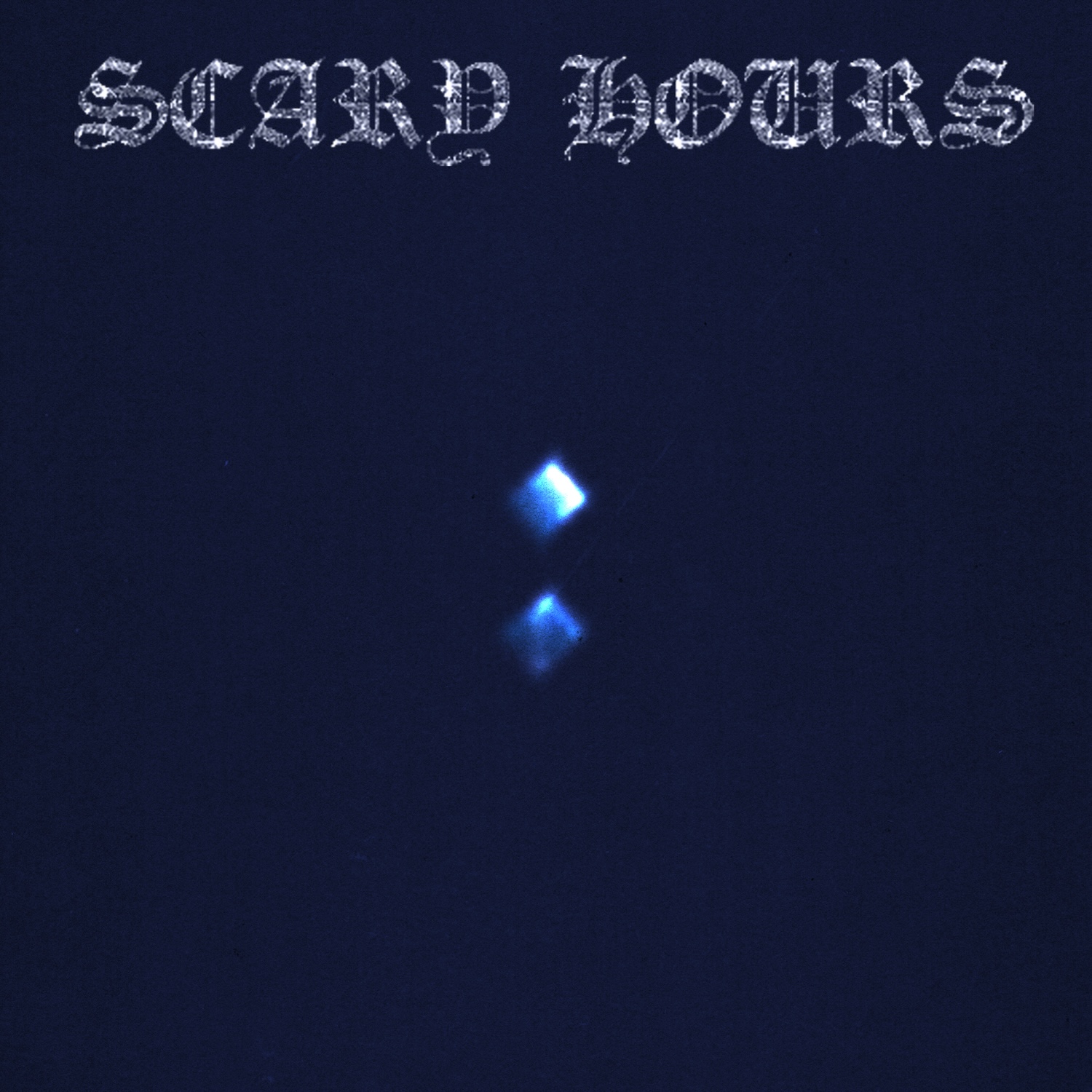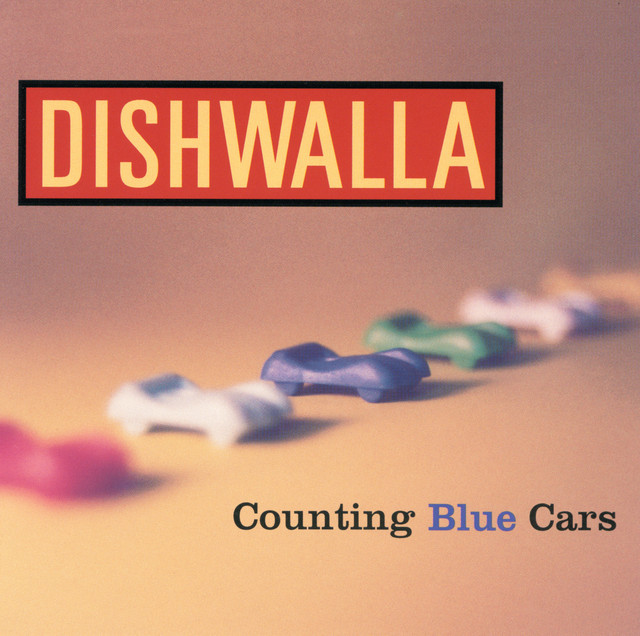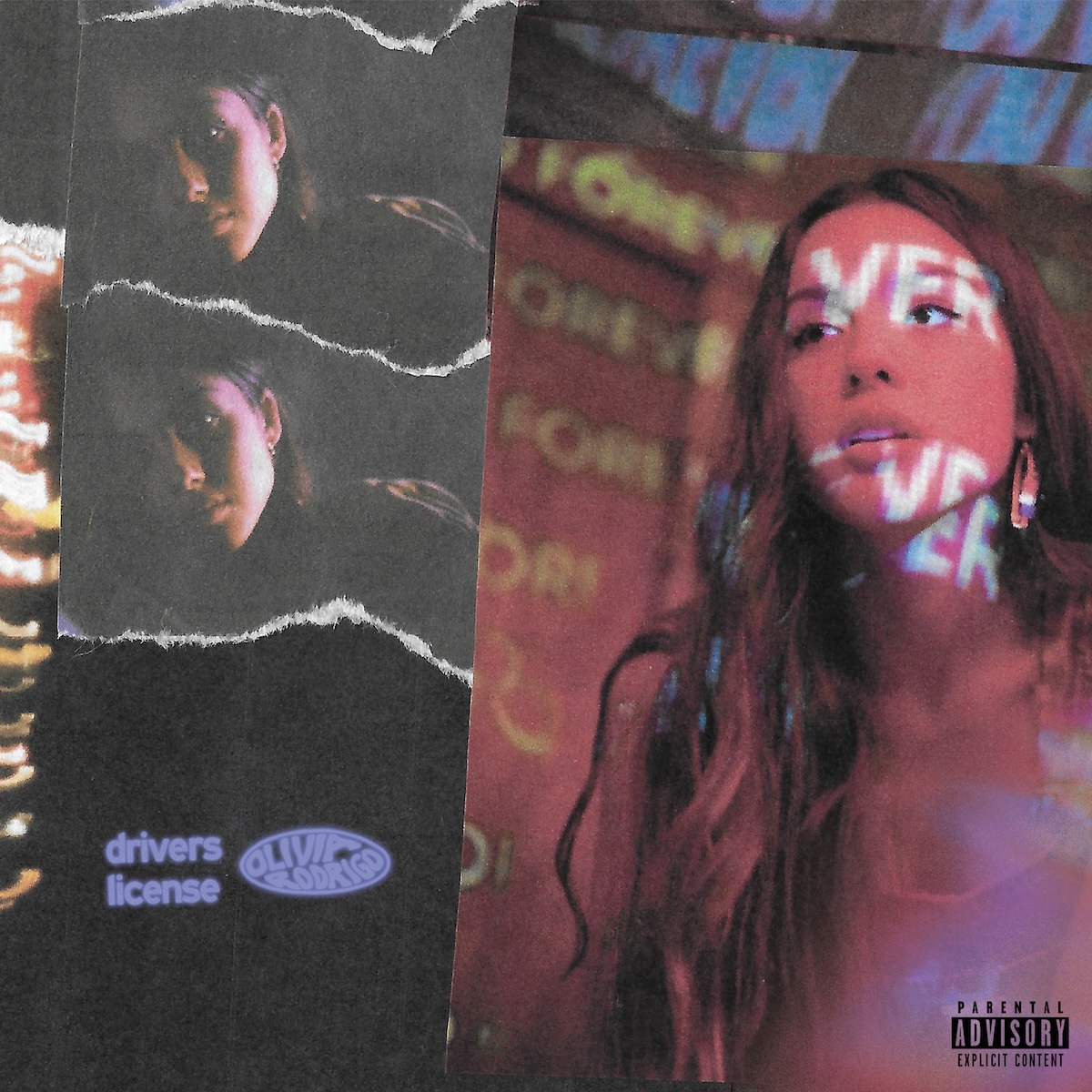I don't really listen to podcasts. I've never been converted to the format for several reasons. The first of those is that I don't have time to listen to anything for an hour or an hour and a half -- if you've got a long commute in the morning and evening, they could be great, I suppose, but I work from my couch, so my listening time is given over to music. Secondly, most of the podcast hosts I've heard are awful. Their voices are nasally and annoying, they do long rambling college-radio introductions before getting around to the interview you presumably clicked on the podcast link to hear in the first place...
That said, there are some really interesting interviews with jazz musicians floating around lately. Jeremiah Cymerman hosts a long-running podcast on the 5049 Records website, and I've recently listened to two episodes that I can absolutely recommend. The first is by drummer Tyshawn Sorey, who's seemingly everywhere these days -- he's on Vijay Iyer's new album, and he's got a trio disc of his own, both of which I wrote about last month; and perhaps more importantly, he's recently become a professor at Wesleyan University. His conversation with Cymerman covers a lot of ground, from growing up in Newark to discovering the music of the AACM and learning about the philosophy behind it. Sorey is much more than a drummer; he's a multi-instrumentalist, and a composer, and someone who thinks a lot about what being a black composer means. There's a lot to digest in this hour-long conversation.
About six weeks after that one went up in mid-July, Cymerman posted a conversation with Bad Plus pianist Ethan Iverson. (Full disclosure: I recently published a book, and Iverson provided a blurb for it.) That interview is equally broad, but very different. They talk about jazz's position in the commercial marketplace, something Sorey doesn't seem interested in at all but which Iverson is very concerned with -- the Bad Plus has never been a group that existed on grants or anything else; they make records for labels that expect them to sell, and they tour hard, playing club dates for a living. But Iverson is also willing to open up about his personal life, talking about his shitty childhood and how it basically drove him into the arms of music...and about his own snobbery, believing that pop and rock music was not only inferior to jazz, but actively bad. It's pretty hilarious to hear him talk about his disdain for the backbeat, especially when you consider that the Bad Plus made their early reputation with reworkings of alt-rock songs. At the same time, he goes deep into what he learns by playing with as many old masters of the music as he can. He's been working with drummers Billy Hart and Albert "Tootie" Heath for many years now, and recently did some New York gigs with Hart and Ron Carter on bass. Again, it's a very interesting conversation, and if you've got an hour and a half or so to spare, you should give it a listen.
I also recently stumbled across a fantastic blog post with some 1980s interview quotes from an interview with drummer Frankie Dunlop, talking about performing with Thelonious Monk in the early 1960s. Dunlop joined Monk's group in 1961, and stayed until about 1965. He can be heard on Monk's Dream, Criss-Cross, Monk In Tokyo, and Big Band And Quartet In Concert, all of which are essential albums from Monk's tenure with Columbia Records.
Dunlop really gives strong insights into Monk's creative mindset in this interview, which is great, because I've never read any interviews where Thelonious Monk talked about his own work that explicitly. For example, Dunlop says,
"Monk always liked an exceptionally strong bass man and drummer. The reason you heard so much straight playing was because Monk didn't consider it a rhythm section -- even though it was a quartet -- unless it had the driving sound -- the dynamics and the attack of a heavy, hard-driving section like those of Count Basie or Duke Ellington. That was the way Monk thought. Rhythmically, his conception was not like the average quartet. From the first beat, Monk's quartet would be just like the rhythm section of any good big band...We were just four pieces, but all of Monk's things would be hard-driving." He also shares a great story of how Monk taught him that it's harder to play slowly than to play fast. Read the whole interview; it's worth it.
Note: 2017 marks Thelonious Monk's centennial -- he was born October 10, 1917. Duke University is putting on a whole program of incredible shows from October 17-26; check out the schedule here, and get there if you can. I really hope those JD Allen Trio-plus-guests performances are recorded.
And now, let's talk about the best new jazz albums of the month!
Archival Find Of The Month: Ornette Coleman, Crisis/Ornette At 12 (Real Gone)
I have rarely been as excited about a reissue as I was when this one was announced in July. I immediately pre-ordered a copy. Ornette Coleman was only signed to Impulse! Records for a couple of years, and the two albums he made for them, 1969's Ornette At 12 and 1972's Crisis, have never been released on CD before, which is totally baffling to me. A few years ago, Impulse! created a line of budget two-for-one reissues and put out paired albums by Charles Mingus, Sonny Rollins, Albert Ayler, Alice Coltrane, Pharoah Sanders and many others, but these two didn't make the cut for some reason. Anyway, they're out now: two albums on one CD, newly remastered from the original tapes, on the Real Gone label, and they're must-hear material. Ornette At 12 is named that because that's how old Denardo Coleman -- born Denardo Ornette Coleman -- was when it was recorded with him on drums. The band also includes Dewey Redman on tenor sax, and Charlie Haden on bass. Crisis, recorded in 1969, adds Don Cherry to the lineup on trumpet, thus reuniting three members of Ornette's classic quartet, the group that made albums like Change Of The Century, The Shape Of Jazz To Come, and This Is Our Music. But the music on both these late '60s albums is very different. It has the same exultant joy and explosive energy, but the melodies are harsher and the overall feel is more aggressive in many ways. Ornette plays violin and trumpet as well as alto, and on both instruments he's going for feel more than technique; he lets loose bursts of sound that don't blend with what the other musicians are doing so much as challenge them to consider why they're playing what they're playing, and if there's an alternate approach available. Note: Real Gone has no digital rights to these albums -- I emailed the label head and asked -- so this reissue won't be showing up on iTunes, Apple Music, or Spotify. Buy it.
Stream "Song For Ché" (This is a rip from the original vinyl):
Kamasi Washington, Harmony Of Difference (Young Turks)
Kamasi Washington came out of nowhere in 2015 and almost instantly became one of the biggest names in 21st century jazz. His debut release, The Epic, was a three-CD slab of '70s-style spiritual grooves bolstered by strings and a choir, with a few surprises, like a version of "Clair De Lune" and a rendition of the standard "Cherokee" that actually included the lyrics. But it was his barnstorming live shows that really made his name; he plays rock venues, to audiences of thousands rather than the 100-150 people most jazz clubs hold. There's been some anticipation of his next move, and here it is: a six-track, 31-minute EP. That could seem like a stopgap, but in fact Harmony Of Difference is a cohesive, powerful statement, confirming and further defining Washington's retro, crowd-pleasing style. The first five pieces are all in the three to four-minute range, and are built around big, hum-along hooks like you'd hear on a Stanley Turrentine or Hank Crawford album from the '70s. The opening, "Desire," and the fourth piece, "Perspective," are purpose-built to get crowds clapping along. The band is composed of his regular cohorts: Dontae Winslow on trumpet, Ryan Porter on trombone, Cameron Graves on piano, Brandon Coleman on keyboards, Miles Mosley on bass, and Tony Austin and Ronald Bruner Jr. on drums. On the final track, "Truth," bassist Thundercat and alto saxophonist Terrace Martin show up along with Washington's father Rickey on flute, plus an orchestra and choir. It's a 13-minute summation of what's come before that gradually becomes mantra-like and sweeping, achieving power through repetition and expansion. This may be "just" an EP, but Washington can say a lot in a half hour. Don't miss this one.
Watch the video for "Truth":
Cecile McLorin Salvant, Dreams And Daggers (Mack Avenue)
I'm generally not one for jazz vocalists. Friends have heard me say many times that scat singing and scat porn share a name for a reason, but this double CD is something interesting. It combines two recording sessions: one in a studio, with her trio (pianist Aaron Diehl, bassist Paul Sikivie, and drummer Lawrence Leathers, all terrific and swinging) joined by a string quartet, and one live at the Village Vanguard with just the trio. The tunes are a mix of standard and slightly more obscure songs, and most of them have a sharp wit when it comes to life and relationships. One standout song is a version of Bessie Smith's "Sam Jones' Blues," the story of a woman whose husband goes on a bender only to find, upon his return, that his wife is now "Miss Wilson" and has no further use for him. Others, like "If A Girl Isn't Pretty" or "Si J'etais Blanche" ("If I Was White"), once sung by Josephine Baker, are even more biting. The track sequence is set up so that studio songs generally alternate with live ones, and they comment on each other; for example, "Si J'etais Blanche" is followed by "Fascination," a Salvant original which sets a Langston Hughes poem about the beauty of black women to music. Similarly, "If A Girl Isn't Pretty" is followed by "Red Instead," another Salvant composition: "I can't really change the way I am/I can be bolder, sharpen my dagger/Cut through the multitudes and make it bright red instead."
Stream "Sam Jones' Blues":
Tony Allen, The Source (Blue Note)
Legendary drummer Tony Allen released a four-song EP earlier this year, A Tribute To Art Blakey And The Jazz Messengers, adding his unique shuffling Afro-funk grooves to tunes like "Moanin'" and "A Night In Tunisia." That was just a teaser for this, though. In collaboration with saxophonist Yann Jankielewicz, he assembled a band that includes two more saxophonists (Rémi Sciuto and Jean-Jacques Elangue), trumpeter Nicolas Giraud, trombonist Daniel Zimmerman, pianist Jean-Phillippe Dary, keyboardist Vincent Taurelle, guitarist Indy Dibongue, and bassist Mathias Allamane. Damon Albarn, with whom Allen has worked on multiple projects, plays piano on one track. He doesn't sing, though; this is an entirely instrumental album. Rather than follow jazz tradition and allow the musicians to trade solos, each track is basically a showcase for a single instrumentalist -- Giraud on "Bad Roads," Zimmerman on "Wolf Eats Wolf," etc. And while the solos that are taken are fierce and fiery, it's the collective sound that makes The Source such a killer album. Allen's beat is loose but impossible to deny; he's all over the kit, setting up polyrhythms and accents and seeming to comment to himself as he goes, but never losing the forward drive. And when he locks in with Allamane on "Cruising," it's enough to make your heart stop. Around that crushing rhythm, the horns stab like lasers and occasionally wail in Mingus-like choruses, and the piano and guitar offer perfectly timed interjections, keeping the groove tight, with elements of reggae and West African funk (Dibongue is from Cameroon, which shares a border with Allen's home country of Nigeria) bolstering the hard bop-derived jazz that is the core of the music. This is a strutting, hard-charging album that's one of the most exciting things I've heard all year.
Stream "Wolf Eats Wolf":
Chet Doxas, Rich In Symbols (Ropeadope)
In June's column, I talked about Riverside, a project saxophonist Chet Doxas and his brother Jim, a drummer, had going with trumpeter Dave Douglas. Well, Chet Doxas has an album out now under his own name, and it's about as far from that music as you can imagine. He plays both woodwinds (sax, clarinet, etc.) and synths, and he's joined by extremely electric guitarist Matthew Stevens, bassist Zack Lober, and drummer Eric Doob. There are a few guests -- Douglas plays on "Hot Ones," pianist John Escreet is heard on "Orchard," Dave Nugent adds still more guitar to "While You Were Sleeping," "I Haven't Seen Color," and "Orchard," and Liam O'Neil contributes additional synths throughout the album. The music was inspired by visual art of the late '70s and early '80s; when the band performs live, works by Jean-Michel Basquiat, Keith Haring, Fab 5 Freddy and Robert Mapplethorpe, among others, are projected behind them. This is not a jazz album per se -- Doob doesn't swing, he drives the beat straight through the floor, with a thick, punchy drum sound "Mutt" Lange would admire. The synths have a hazy synthwave feel, all zap, pulse and echo. Doxas's solos sound like they could have come off a Tina Turner album. And Stevens' playing is cranked-up and ultra-slick at the same time. Ultimately, it might appeal as much to fans of Trans Am as to jazz listeners. But it's high-energy and enjoyable, so check it out.
Stream "While You Were Sleeping":
Jane Ira Bloom, Wild Lines: Improvising Emily Dickinson (Outline)
Soprano saxophonist Jane Ira Bloom's latest is a two-CD set inspired by the poetry of Emily Dickinson, and perhaps more importantly by Bloom's discovery that Dickinson was a pianist and an improviser. She has written 14 compositions, which appear on the first disc as instrumentals, and on the second accompanied by readings from Dickinson by actress Deborah Rush (Carol Chapman on Orange Is The New Black). The music has nothing of the 19th century about it -- pianist Dawn Clement, bassist Mark Helias, and drummer Bobby Previte swing hard, though they frequently break down into abstraction (but not free jazz). Bloom's soprano playing is more clarinet-like than squawky, minimizing the soprano's more obnoxious qualities. And the instrumental and vocal versions of each piece are often very different from each other. The instrumental of "One Note From One Bird" features a strutting, thumping Previte drum line, and Bloom's solo flutters and bounces around, with occasional zooming long tones that almost sound fed through a pedal. When Rush introduces the second version, though, she's accompanied by melancholy solo piano, and it's Clement who dominates the subsequent improvisation.
Stream the vocal version of "One Note From One Bird":
Blue Note All-Stars, Our Point of View (Blue Note)
This is the second crew of musicians to take the name Blue Note All-Stars; the first, assembled in 1996, included trumpeter Tim Hagans, alto saxophonist Greg Osby, tenor saxophonist Javon Jackson, pianist Kevin Hays, bassist Essiet Essiet, and drummer Bill Stewart. Their album Blue Spirit is on Spotify; check it out. This new group features Ambrose Akinmusire on trumpet, Marcus Strickland on tenor sax, Robert Glasper on keyboards, Lionel Loueke on guitar, Derrick Hodge on bass, and Kendrick Scott on drums. Each man contributes at least one composition (Akinmusire, Glasper and Hodge offer two each), and the group also essays versions of two Wayne Shorter pieces, "Witch Hunt" and "Masqualero." On the latter, Shorter himself and pianist Herbie Hancock make guest appearances. "Second Light," a Hodge composition, features muted trumpet from Akinmusire and slowly unfurling, cello-like guitar from Loueke; it's almost more like an interlude than a full track, but its quiet beauty gives it a power that transcends its short running time.
Stream "Second Light":
Nicole Mitchell & Haki Madhubuti, Liberation Narratives (Third World Press)
Haki Madhubuti, formerly known as Don L. Lee, is a Chicago-based poet and the founder of Third World Press. Nicole Mitchell, flautist, composer and bandleader, worked for Third World from 1990 till the early 2000s. On this album, Mitchell and her band -- trumpeter Pharez Whitted, cellist Tomeka Reid, violinist Rene Baker, pianist Miguel de la Cerna, bassist Harrison Bankhead, and drummer Tomas Fujiwara -- back Madhubuti as he reads his poetry. There's also a female vocalist, Ugochi, who repeats Madhubuti's lines back at him, sings them, and generally serves as a counterpoint and amplifier. The performance was taped live at the University of Chicago last November 11 -- yeah, two days after the election. Miraculously, it's an expression of joy and vitality and not an hour-long scream. Mitchell's flute is rarely a lead voice; she seems like an organizing force, and someone whose energy dictates the direction the band will move, more than a conductor or anything so authoritative. And the band is killer; Bankhead and Fujiwara in particular are amazing, switching moods and grooves on a dime as Baker and Reid serve as both individual voices and a mini-string section. Whitted, who I've previously heard doing showier, more rip-roaring work, is a subtle voice, diving deep into the blues in a way that puts Wynton Marsalis's similar efforts in the shade.
Stream "Poetry":
Trevor Lawrence Jr., Relationships (Ropeadope)
I feel reasonably confident stating that this is the last time you will ever see LeAnn Rimes' name in this column. But she sings on "Lovestoned," the closing track of drummer Trevor Lawrence Jr.'s album, and she doesn't sound anything like I remember her as a country princess. Lawrence, a veteran sideman, has a lot of special guests on Relationships, including Kamasi Washington and Terrace Martin on "Cornerstone," and trumpeters Nicholas Payton and Maurice "Mobetta" Brown. Two other saxophonists, Chelsea Baratz and Teodross Avery, appear on other songs. This is a slick, modern jazz-funk album, blending R&B and just a dash of L.A. hip-hop with slow, simmering arrangements. Lawrence's drumming has a forceful, slap-and-clatter sound, and the arrangements are heavy on keyboards, both synth and piano, with strings filling out the background on several cuts. Horn solos arise organically out of the mix, and are swallowed up again when they wind down. Several tracks feature soul/R&B vocals, and Sharrif Simmons delivers a militant-ish rap on "The Guts."
Stream "Cornerstone":
Sam Bardfeld, The Great Enthusiasms (Brooklyn Jazz Underground)
Violinist Sam Bardfeld's compositions, performed here with pianist Kris Davis and drummer Michael Sarin, are in a weird blurry zone between chamber music and vernacular folk/blues. This is definitely the result of his own background: while he's spent a lot of time on the New York City avant-garde underground, he also works with Bruce Springsteen. (He can be heard on We Shall Overcome: The Seeger Sessions, Live In Dublin, and High Hopes.) There's a version of the Springsteen/Patti Smith song "Because The Night" here, and a take on the Band's "King Harvest (Has Surely Come)" -- both tracks are transformed into stark, somewhat abstract meditations, their melodies disassembled into floating lines that only half come together. "King Harvest" is more structured, driven by a thumping beat, but it still only manages to hold together for a minute or so at a time. Anyway, the five original pieces are the heart of the album. The opener, "Fails While Daring Greatly," has an almost martial feel, and Kris Davis's piano solo features some of the heaviest left hand I've heard by anybody not named Cecil Taylor.
Stream "Fails While Daring Greatly":
Uri Gurvich, Kinship (Jazz Family)
Alto and soprano saxophonist Uri Gurvich has roots in both Israel and Argentina, and draws from both on this album. The band includes pianist Leo Genovese, bassist Peter Slavov, and drummer Francisco Mela, with Bernardo Palombo contributing a poem to "El Chubut," named for an Argentine prison. The group performs two pieces, "Im Tirtzi" and "Ha'im Ha'im," by noted Israeli composer Sasha Argov, and a version of the traditional spiritual "Go Down Moses," but the bulk of the music is by Gurvich. It's easy to understand why John Zorn invited him to make two previous albums for Tzadik; "Blue Nomad" combines Middle Eastern melodies with Latin rhythms into something unique and hypnotic. "Twelve Tribes" pulls off a similar trick, with Gurvich flying through rapid, bebop-inflected lines as the band swirls like a desert zephyr behind him.
Stream "Twelve Tribes":
Harold Mabern, To Love And Be Loved (Smoke Sessions)
Pianist Harold Mabern has been on the scene since the 1950s, recording more as a sideman than as a leader, though he's got over 20 albums to his name. This is his third release for the Smoke Sessions label, and his first since 2012 not to feature bassist John Webber and drummer Joe Farnsworth; instead, Nat Reeves is on bass and Jimmy Cobb (the last living member of the band from Miles Davis's Kind Of Blue) is behind the kit, with Eric Alexander on tenor sax, Freddie Hendrix on trumpet on three tracks, and Cyro Baptista contributing percussion to the opening title track. Mabern has done everything from accompanying singers to playing smooth jazz-funk electric piano to playing with multi-piano ensembles. Here, though, he's in hard bop mode, leading the band through standards like "If There Is Someone Lovelier Than You," "My Funny Valentine," and "I Get A Kick Out Of You." They also play Lee Morgan's "The Gigolo" (Mabern was in Morgan's final band, and was present the night he was shot and killed by his girlfriend, in 1972), which is an excellent showcase for Hendrix's fiery trumpet. The version of "So What," from Kind Of Blue, is less successful, mostly because Reeves pushes the bass line too forcefully instead of letting it drift along. Still, this is a great, straightforward "jazz-club jazz" album by a crew of veterans.
Stream "The Gigolo":
Mark Guiliana Jazz Quartet, Jersey (Motema)
As a lifelong New Jersey resident myself, I knew I had to include this album in this month's column. Drummer MarkGuiliana is a member of saxophonist Donny McCaslin's band, which means that, yeah, he played on David Bowie's final album, Blackstar. But he's also been leading this group -- with saxophonist Jason Rigby, pianist Fabian Almazan, and bassist Chris Morrissey -- for two albums now; Family First came out in 2015. Giuliana's well known for his ability to blend forceful jazz swing with crisp, machine-gun rhythms derived from electronic music, and he does that here quite a bit. The opening track, "Inter-Are," is built on top of an ominous, suspenseful beat, with Rigby's saxophone holding back, like a boxer shifting rapidly from foot to foot before charging into the center of the ring. There are plenty of simmering ballads here, too, though, including an album-closing version of Bowie's "Where Are We Now?" (from The Next Day), which is so subdued it's barely there at all; Giuliana dances the sticks across the cymbals, and occasionally taps a tom. Only in its final minute or so do he and Rigby erupt, as the entire band, plus Giuliana's wife Gretchen Parlato and their son Marley, sing the chorus.
Stream "Inter-Are":
Darren Barrett, The Opener (Self-Released)
Trumpeter Darren Barrett lives in the zone between jazz and modern R&B/funk; he's played with Herbie Hancock and in Roy Hargrove's big band, but has also worked with Common, D'Angelo and will.i.am. This album marks the debut of his band dB-ish, an electro-fusion ensemble that includes saxophonists Clay Lyons and Erena Terakubo, Santiago Bosch on piano and keyboards, Chad Selph on keyboards, Alexander Toth on bass, Anthony Toth on drums, and percussionist Judith Barrett. Guest guitarists appear on two tracks: Kurt Rosenwinkel on the album-opening title track, and Nir Felder on "To Conversate." In some ways, the music on The Opener falls in between that of Christian Scott -- who blends '80s Miles Davis and trap beats -- and Thundercat's more overtly jazz-fusion work, but there's a dub and reggae element as well, and some of the solos, particularly from the saxophonists, are definitely coming out of the bebop and hard bop traditions. Rosenwinkel, a pedal-happy guitarist most of the time anyway, really takes advantage of the future-music atmosphere in his guest spot; at first, it's hard to tell whether he's even playing a guitar -- it could be a keytar, or a theremin.
Stream "The Opener":
Tobias Meinhart, Silent Dreamer (Enja)
Saxophonist Tobias Meinhart is paired with trumpeter Ingrid Jensen for most of this relatively concise (nine tracks in under 48 minutes) album. He doubles on Electronic Wind Instrument (EWI), a synth-like gadget; her horn is fed through effects pedals half the time. The band also includes Yago Vasquez on piano and Fender Rhodes, bassist Phil Donkin on six tracks and Orlando LeFleming on the other three, and drummer Jesse Simpson. Justin Carroll contributes synth to two pieces, and Charles Altura plays guitar on three. The music has a modern, twitchy rhythm; Simpson slices up the beat with such complexity it's almost like he's soloing (when he does take a solo, on "Equality," it's a Max Roach-like make-the-toms-sing showcase, and it's great). Meinhart seems very willing to cede the spotlight to others. His horn lines are quick and bebop-infused, though the EWI occasionally turns them into iridescent ribbons of sound. He harmonizes well with Jensen, and on the three tracks that feature Altura, their styles mesh perfectly. "Silent Dreamer" starts off mellow, then becomes a swinging burner.
Stream "Silent Dreamer":
Jason Stein Quartet, Lucille! (Delmark)
Bass clarinetist Jason Stein has done a lot of excellent work on the Delmark label, both as a leader and a collaborator. On this album, he grapples with the work of Lennie Tristano, a pianist whose work bridged bebop and later, more abstract/intellectual forms and who has a cult following, but is mostly forgotten by the mainstream. Stein and his bandmates -- tenor saxophonist and contrabass clarinetist Keefe Jackson, bassist Joshua Abrams, and drummer Tom Rainey -- tackle two Tristano pieces, "April" and "Wow." They also interpret "Marshmallow," by one of Tristano's students/acolytes, saxophonist Warne Marsh, and a few other interesting pieces: Charlie Parker's "Dexterity," Thelonious Monk's "Little Rootie Tootie," and maybe the biggest surprise of all, "Roused About," a piece written by bassist Robert Hurst and recorded on Branford Marsalis's 1991 album The Beautyful Ones Are Not Yet Born. The Monk and Marsalis tunes get abstracted the most, while the Tristano, Marsh and Parker pieces all get relatively reverent treatment, probably because their high-speed, intricate melody lines require concentration and focus. Still, they're timbrally warped by being played on bass and contrabass clarinet, two relatively low, grumbling instruments, and with no piano to hammer chords into place, things get weird at times. "Wow" is a tootling low-end romp on which Abrams and Rainey strut and bounce as the reeds wander all over the place, emitting high-speed flurries of notes and talking past each other in frantic bursts of energy, but still coming together for the half-swinging, half-knuckle-busting melody.
Stream "Wow":
Bruce Harris, Beginnings (Posi-Tone)
Trumpeter Bruce Harris makes his debut as a leader with this release. The core band is pianist Michael Weiss, bassist Clovis Nicholas, and drummer Pete Van Nostrand, and there are multiple saxophonists present, depending on the track: Andy Farber, Grant Stewart, and Jerry Weldon on tenor; Dmitry Baevsky on alto; and Frank Basile on baritone. Harris has come up through ghost bands (bands where the original leader is long dead) like the Artie Shaw Orchestra, the Dizzy Gillespie Alumni All-Stars, the Glenn Miller Orchestra, and the Count Basie Orchestra, but he also plays with living veterans like drummer Jimmy Cobb, pianist Barry Harris, and others. He was also picked by Wynton Marsalis to perform in the Broadway musical After Midnight, and that's no surprise; his style reminds me of Marsalis's. His playing is bluesy but extremely fluid and ultimately somewhat restrained -- though the music on this album is classicist hard bop, he never goes over the top the way a player like Lee Morgan or Freddie Hubbard might. And when he puts the mute in, he goes for a slightly fuzzy growl, much the way Marsalis does. The opening number, "Ask Questions," features Baevsky and Basile; it's a fast, jumpy burner with as much space for Van Nostrand to rip things up as any of the horn players. This is a really pretty record that offers no surprises, but the pleasures of classic jazz, well played, are hard to overstate, so if that's what you're in a mood for, here you go.
Stream "Ask Questions":
